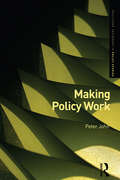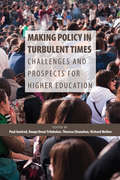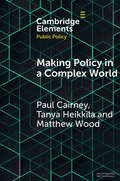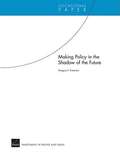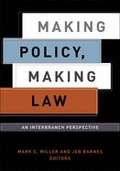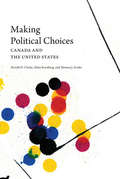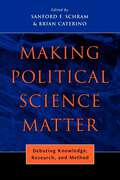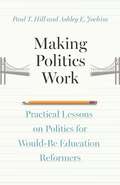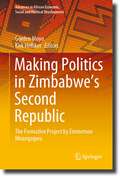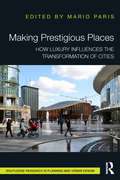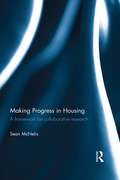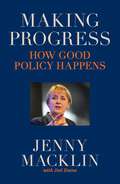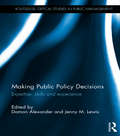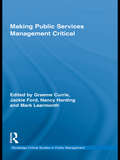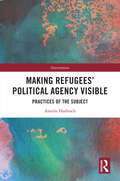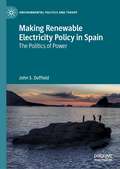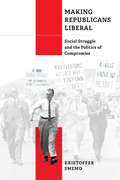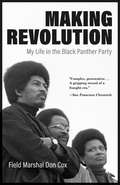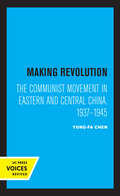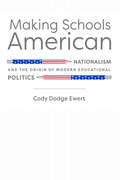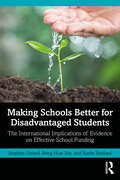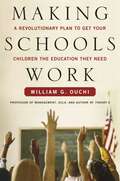- Table View
- List View
Making Policy Public
by Susan L. MoffittThis book challenges the conventional wisdom that government bureaucrats inevitably seek secrecy and demonstrates how and when participatory bureaucracy manages the enduring tension between bureaucratic administration and democratic accountability. Looking closely at federal level public participation in pharmaceutical regulation and educational assessments within the context of the vast system of American federal advisory committees, this book demonstrates that participatory bureaucracy supports bureaucratic administration in ways consistent with democratic accountability when it focuses on complex tasks and engages diverse expertise. In these conditions, public participation can help produce better policy outcomes, such as safer prescription drugs. Instead of bureaucracy's opposite or alternative, public participation can work as its complement.
Making Policy Work (Routledge Textbooks in Policy Studies)
by Peter JohnMany tools are on offer to politicians and other policy-makers when they seek to change policy outcomes. Often they choose to concentrate on one set of tools, but fail to see the costs as well as the benefits – and may not consider the available evidence regarding their effectiveness. This innovative new textbook clearly sets out the main tools of government, and provides an analysis of their efficacy when applied to public problems. Each chapter examines the relative benefits and costs of using a key tool that is available to improve policy outcomes, drawing on a diverse literature, a large number of empirical studies and a range of contexts. Areas covered include: governments and policy outcomes law and regulation public spending and taxation bureaucracy and public management institutions information, persuasion and deliberation networks and governance. Offering a clear and comprehensive evaluation, and highlighting the set of powerful tools commonly available, this text encourages students to consider the most effective combination in order to manage key issues successfully. Including a useful glossary of key terms, this book will be of great interest to all students of public policy, administration and management.
Making Policy in Turbulent Times: Challenges and Prospects for Higher Education
by Theresa Shanahan Paul Axelrod Roopa Desai Trilokekar Richard WellenHow is policy made in higher education, particularly in the wake of recent economic turbulence? Has policy development converged internationally, and if so, what impact has this had on academic life and institutions? What role does policy-oriented research play in shaping the direction of higher education? Are universities grappling in common ways with issues of access and equity? Making Policy in Turbulent Times provides a historically informed and nuanced response to these and other questions. Distinguished scholars and administrators from across the globe identify economic challenges and pressures facing universities, compare policy developments in numerous jurisdictions, and demonstrate the ways in which networks and lobbyists achieve results. Cogently argued, Making Policy in Turbulent Times contributes significantly to new research, and will be of great interest to scholars and practitioners alike.
Making Policy in Turbulent Times: Challenges and Prospects for Higher Education (Queen's Policy Studies Series #306)
by Paul Axelrod Roopa Desai Trilokekar Richard Wellen Theresa ShanahanHow is policy made in higher education, particularly in the wake of recent economic turbulence? Has policy development converged internationally, and if so, what impact has this had on academic life and institutions? What role does policy-oriented research play in shaping the direction of higher education? Are universities grappling in common ways with issues of access and equity? Making Policy in Turbulent Times provides a historically informed and nuanced response to these and other questions. Distinguished scholars and administrators from across the globe identify economic challenges and pressures facing universities, compare policy developments in numerous jurisdictions, and demonstrate the ways in which networks and lobbyists achieve results. Cogently argued, Making Policy in Turbulent Times contributes significantly to new research, and will be of great interest to scholars and practitioners alike.
Making Policy in a Complex World (Elements in Public Policy)
by Matthew Wood Tanya Heikkila Paul CairneyThis provocative Element is on the 'state of the art' of theories that highlight policymaking complexity. It explains complexity in a way that is simple enough to understand and use. The primary audience is policy scholars seeking a single authoritative guide to studies of 'multi-centric policymaking'. It synthesises this literature to build a research agenda on the following questions: 1. How can we best explain the ways in which many policymaking 'centres' interact to produce policy? 2. How should we research multi-centric policymaking? 3. How can we hold policymakers to account in a multi-centric system? 4. How can people engage effectively to influence policy in a multi-centric system? However, by focusing on simple exposition and limiting jargon, Paul Cairney, Tanya Heikkila, Matthew Wood also speak to a far wider audience of practitioners, students, and new researchers seeking a straightforward introduction to policy theory and its practical lessons.
Making Policy in the Shadow of the Future
by Gregory F. TrevertonThe National Intelligence Council's 2008 report "Global Trends 2025: A Transformed World" projects what the world will look like in 2025 based on recent trends. This paper asks: How should U.S. policy adapt now to account for these trends and the future that will result from them? The author explores such issues as climate change, defense, international relations, and the structure of the federal government.
Making Policy, Making Law: An Interbranch Perspective (American Governance And Public Policy)
by Mark Miller Jeb Barnes Robert KatzmannThe functioning of the U.S. government is a bit messier than Americans would like to think. The general understanding of policymaking has Congress making the laws, executive agencies implementing them, and the courts applying the laws as written--as long as those laws are constitutional. Making Policy, Making Law fundamentally challenges this conventional wisdom, arguing that no dominant institution--or even a roughly consistent pattern of relationships--exists among the various players in the federal policymaking process. Instead, at different times and under various conditions, all branches play roles not only in making public policy, but in enforcing and legitimizing it as well. This is the first text that looks in depth at this complex interplay of all three branches. The common thread among these diverse patterns is an ongoing dialogue among roughly coequal actors in various branches and levels of government. Those interactions are driven by processes of conflict and persuasion distinctive to specific policy arenas as well as by the ideas, institutional realities, and interests of specific policy communities. Although complex, this fresh examination does not render the policymaking process incomprehensible; rather, it encourages scholars to look beyond the narrow study of individual institutions and reach across disciplinary boundaries to discover recurring patterns of interbranch dialogue that define (and refine) contemporary American policy. Making Policy, Making Law provides a combination of contemporary policy analysis, an interbranch perspective, and diverse methodological approaches that speak to a surprisingly overlooked gap in the literature dealing with the role of the courts in the American policymaking process. It will undoubtedly have significant impact on scholarship about national lawmaking, national politics, and constitutional law. For scholars and students in government and law--as well as for concerned citizenry--this book unravels the complicated interplay of governmental agencies and provides a heretofore in-depth look at how the U.S. government functions in reality.
Making Political Choices: Canada And The United States
by Harold D. Clarke Allan Kornberg Thomas J ScottoRecent national elections in Canada and the United States have been exciting, consequential contests. In the 2004 federal election in Canada, the Liberal Party narrowly clung to power after a volatile and bitter battle with the new Conservative Party. In 2006, the Conservative Party won a fragile victory, replacing the scandal-ridden Liberal government. In the 2000 American presidential election, Republican George W. Bush became the first candidate in over 100 years to capture the presidency without a majority popular vote. Four years later, Bush finally attained a narrow popular mandate but only after a hard fought campaign. Then, in 2006, the Republicans suffered a stunning reversal of political fortune, losing control of both Houses of Congress, as public opinion turned massively against the president.In Making Political Choices: Canada and the United States, Harold Clarke, Allan Kornberg, and Thomas Scotto employ a wealth of new survey data to describe these elections and evaluate competing theories of party support and voter turnout. While examining various arguments, the authors contend that a valence politics model provides a powerful explanation of voting behavior in Canada, the United States, and other mature democracies.
Making Political Science Matter: Debating Knowledge, Research, and Method
by Sanford F. Schram Brian CaterinoMaking Political Science Matter brings together a number of prominent scholars to discuss the state of the field of Political Science. In particular, these scholars are interested in ways to reinvigorate the discipline by connecting it to present day political struggles. Uniformly well-written and steeped in a strong sense of history, the contributors consider such important topics as: the usefulness of rational choice theory; the ethical limits of pluralism; the use (and misuse) of empirical research in political science; the present-day divorce between political theory and empirical science; the connection between political science scholarship and political struggles, and the future of the discipline. This volume builds on the debate in the discipline over the significance of the work of Bent Flyvbjerg, whose book Making Social Science Matter has been characterized as a manifesto for the Perestroika Movement that has roiled the field in recent years.Contributors include: Brian Caterino, Stewart Clegg, Bent Flyvbjerg, Mary Hawkesworth, Patrick Thaddeus Jackson, Gregory J. Kasza, David Kettler, David D. Laitin, Timothy W. Luke, Theodore R. Schatzki, Sanford F. Schram, Peregrine Schwartz-Shea, Corey S. Shdaimah, Roland W. Stahl, and Leslie Paul Thiele.
Making Politics Work: Practical Lessons on Politics for Would-Be Education Reformers
by Paul T. Hill Ashley E. JochimAn expansive study shows how politics can work for, not just against, efforts to improve America’s schools. The education reform project has always been about making America’s schools more effective for the children who attend them. In Making Politics Work, authors Paul T. Hill and Ashley E. Jochim show that this project cannot succeed without mastering what is the single largest constraint on its success: politics. Drawing upon more than a decade of work with dozens of school systems, Hill and Jochim show how failures to secure political support or mitigate inevitable opposition dooms the education reform project from the start. But this outcome is not inevitable. By tracing the evolution of the “portfolio strategy” across 27 localities that implemented it, they uncover practical lessons that superintendents, state leaders, and foundation officials can use to increase the likelihood that their ideas for improving public education don’t join the list of once-promising initiatives that could not be sustained in the face of intractable political conflict.
Making Politics in Zimbabwe’s Second Republic: The Formative Project by Emmerson Mnangagwa (Advances in African Economic, Social and Political Development)
by Kirk Helliker Gorden MoyoThe book provides a fresh and innovative interpretation of the new government of Zimbabwe led by Emmerson Mnangagwa, which emerged in late 2017 after the downfall of Robert Mugabe. It demonstrates the contradictory character of the Mnangagwa government, involving both continuities and discontinuities in relation to Mugabe’s regime . The temptation amongst Zimbabwean scholars has been to focus on the continuities and to dismiss the significance of any discontinuities, notably reform measures. This book adopts an alternative approach by identifying and focusing specifically on the existence of a formative project of the Mnangagwa’s Second Republic, further analysing its political significance, as well as risks and limitations. While doing so, the book covers topics such as reform measures, reconciliation, transitional justice, corruption, the media, agriculture, devolution, and the debt crisis as well as health and education. Discussing the limitations of these different reform measures, the book highlights that any scholarly failure to identify the risks of the project leads to an incomplete understanding of what constitutes the Mnangagwa’s Second Republic. The book appeals to students, scholars and researchers of Zimbabwean and African studies, political science and international relations, as well as policymakers interested in a better understanding of political reform processes.
Making Prestigious Places: How Luxury Influences the Transformation of Cities
by Mario ParisMaking Prestigious Places investigates the spatial dimension of luxury, both as a sector involving activities, operators and investments, and as a system of values acting as a catalyst for recent urban transformations. Luxury shares a well-established connection to the city, as a place of production, consumption and self-representation, and continues to grow despite economic difficulties. This edited collection includes case studies from Europe, North and South America, Asia and the Middle East to create a dialogue around these developments and the challenges presented, such as the tension between the idea of prestige and current values in urban planning, the discussion between academic reflections and operational practices, and how these interact with the long-term economic and social dynamic of the city. With rich analysis and a preface written by Patsy Healey, this book will be an important addition to the discourse on luxury for urban planners and researchers.
Making Progress in Housing: A Framework for Collaborative Research (Routledge Housing Research Series)
by Sean McNelisThis book presents a new approach to housing research, one that is relevant to all the social sciences. Housing research is diverse and operates across many disciplines, approaches and methods making collaboration difficult. This book outlines a methodological framework that enables researchers from many different fields to collaborate in solving complex and seemingly intractable housing problems. It shows how we can make progress in housing research and deliver better housing outcomes through an integrated approach. Drawing on the work of renowned Canadian methodologist, philosopher, theologian and economist, Bernard Lonergan (1904–1984), McNelis outlines a framework for collaborative research: Functional Collaboration. This new form of collaboration divides up the work of housing research into functional specialties. These distinguish eight inter-related questions that arise in the process of moving from the current housing situation through to providing practical advice to decision-makers. To answer each question a different method is required. Making progress in housing is the result of finding new answers to this complete set of eight inter-related questions. This approach to collaboration opens up a new discourse on method in housing and social research as well as new debates on progress and the nature of science.
Making Progress: How good policy happens
by Jenny Macklin Joel DeaneIs big policy reform still possible? Does Australia have the political will to tackle generational issues such as climate change, the housing crisis, rising inequality and Closing the Gap? Legendary Labor policymaker Jenny Macklin believes that if Australia wants to remain prosperous and fair, big policy reform is not just possible, it's essential. Making Progress takes us into the policy engine room and details how Macklin went about developing transformational initiatives such as the Apology to the Stolen Generations, paid parental leave and the National Disability Insurance Scheme, as well as delivering pension reforms that lifted one million Australians out of poverty. She explains how she became a policy wonk, and interviews key policymakers such as Julia Gillard, Brian Howe, Bill Kelty, Tanya Plibersek and Ross Garnaut, who share how they war-gamed ways to turn good policy ideas into reality. Part policy memoir, part war-room drama, part field guide, Making Progress: How Good Policy Happens is a political book with a message-and a method.
Making Public Policy Decisions: Expertise, skills and experience (Routledge Critical Studies in Public Management)
by Jenny M. Lewis Damon AlexanderTo understand public policy decisions, it is imperative to understand the capacities of the individual actors who are making them, how they think and feel about their role, and what drives and motivates them. However, the current literature takes little account of this, preferring instead to frame the decisions as the outcomes of a rational search for value-maximising alternatives or the result of systematic and well-ordered institutional and organisational processes. Yet understanding how personal and emotional factors interact with broader institutional and organisational influences to shape the deliberations and behaviour of politicians and bureaucrats is paramount if we are to construct a more useful, nuanced and dynamic picture of government decision-making. This book draws on a variety of approaches to examine individuals working in contemporary government, from freshly-trained policy officers to former cabinet ministers and prime ministers. It provides important new insights into how those in government navigate their way through complex issues and decisions based on developed expertise that fuses formal, rational techniques with other learned behaviours, memories, emotions and practiced forms of judgment at an individual level. This innovative collection from leading academics across Australia, Europe, the United Kingdom and North America will be of great interest to researchers, educators, advanced students and practitioners working in the fields of political science, public management and administration, and public policy.
Making Public Services Management Critical (Routledge Critical Studies in Public Management)
by Jackie Ford Nancy Harding Mark Learmonth Graeme CurrieThis book brings together public services policy and public services management in a novel way that is likely to resonate with academics, policy makers and practitioners engaged in the organization of public services delivery as it is from a perspective that challenges many received ideas in this field. Starting from the perspective of critical management studies, the contributors to this volume embed a critical perspective on policy orthodoxy around critical public services policy and management studies (CPPMS). In so doing the authors bring together previous disparate fields of public services policy and public services management, but more importantly, debate and present what ‘critical’ constitutes when applied to public services policy and management. This edited collection presents chapters from a broad range of public services domains including health, education, prisons, local and central government and deals with a range of contemporary issues facing public services managers are examined, including regulation of professions, risk management, user involvement, marketing and leadership.
Making Refugees’ Political Agency Visible: Practices of the Subject (Interventions)
by Amelie HarbischThis book centres refugees and asylum seekers as agents of global politics, broadening our thinking about political agency beyond statism, citizenship, and organized political protest. Arguing that to understand forced migration, we must understand the construction of refugees as individual human subjects and how subconscious ideas about refugees influence daily practices and policies, the author studies how refugees make meaning about themselves. Forced migration is a key formative phenomenon of international politics but debates habitually discuss displacement only as an abstract number, economic challenge, or security issue. This volume shifts attention to the individual human subjects as overlooked agents of international relations. To this end, the book rethinks individual subjects altogether and develops a comprehensive practice-theoretical framework of subject construction. Through extensive ethnographic data generated with refugees in Germany and Austria, the author reveals how refugees are depoliticized, and how they combat this using creativity, humour, and intercultural resources. This volume highlights people’s agency despite being subjected to powerful ideas and mechanisms. It will appeal to scholars and students of International Relations, Sociology, Political Science, and Migration Studies.
Making Religion Safe for Democracy
by J. Judd OwenDoes the toleration of liberal democratic society mean that religious faiths are left substantively intact, so long as they respect the rights of others? Or do liberal principles presuppose a deeper transformation of religion? Does life in democratic society itself transform religion? In Making Religion Safe for Democracy, J. Judd Owen explores these questions by tracing a neglected strand of Enlightenment political thought that presents a surprisingly unified reinterpretation of Christianity by Thomas Hobbes, John Locke, and Thomas Jefferson. Owen then turns to Alexis de Tocqueville's analysis of the effects of democracy on religion in the early United States. Tocqueville finds a religion transformed by democracy in a way that bears a striking resemblance to what the Enlightenment thinkers sought, while offering a fundamentally different interpretation of what is at stake in that transformation. Making Religion Safe for Democracy offers a novel framework for understanding the ambiguous status of religion in modern democratic society.
Making Renewable Electricity Policy in Spain: The Politics of Power (Environmental Politics and Theory)
by John S. DuffieldThis book examines the politics of renewable electricity policy in democratic Spain. It provides the first comprehensive political analysis of how and why successive Spanish governments have increased or reduced support for renewable power, especially wind and solar. In particular, it identifies the key influences that have been brought to bear on decision making by the core executive as it has sought to determine the appropriate role of renewable sources in the country’s electricity mix. Following the introduction, four chapters chart the dramatic rise, fall, and, most recently, renewed rise in support for utility-scale renewable power, from the early 1980s to the present. Another chapter details the decade-long political struggle over the regulation of small-scale distributed renewable electricity generation. The penultimate chapter explores the future prospects for renewable power in Spain, and the final chapter offers an overarching explanation of the patterns of policy outcomes observed.
Making Republicans Liberal: Social Struggle and the Politics of Compromise (Politics and Culture in Modern America)
by Kristoffer SmemoMass movements and social protest forced mid-century Republicans to articulate their own form of liberalismAs poor and working people organized themselves on the job, in the streets, and at the polls during the mid-twentieth century, they forced Republicans to reckon with new demands for political and social citizenship in big cities across the Northeast, Midwest, and Pacific Coast. While rightwing Republicans mobilized to crush those movements, Making Republicans Liberal explores how another wing of the party responded to intensifying mass movement pressure. Beginning in the 1930s, Republican governors such as Earl Warren of California, George Romney of Michigan, and Nelson Rockefeller of New York spent the next four decades articulating their own vision of liberalism. These Republican liberals believed that strategically they could not win elections and govern in places where unions, civil rights groups, and other social movements organized voters.What may have begun as an opportunistic strategy soon mutated into an ideological commitment to use state power to realize working people’s demands for a greater say, and stake, in the decisions governing their lives. Republican liberals accepted labor’s right to organize, legislated antidiscrimination laws, and legalized abortion. Yet at the same time, each of those policies proved weaker than the alternatives supported by organized labor or mainline civil rights groups and paled in comparison to what people on strike and on the march really wanted. Kristoffer Smemo shows how this was the contradiction of Republican liberalism as a policy program and as an ideology. The reforms it ushered in at once asked too much from core, conservative Republican constituencies and offered too little to the movements struggling for change. As the movements making Republicans compromise fragmented and collapsed in the late twentieth century, so too did the material foundation for Republican liberalism.
Making Revolution: My Life in the Black Panther Party
by Field Marshal Don CoxMaking Revolution is Don Cox’s revelatory, even incendiary account of his years in the Black Panther Party. He had participated in many peaceful Bay Area civil rights protests but hungered for more militant action. His book tells the story of his work as the party’s field marshal in charge of gunrunning to planning armed attacks—tales which are told for the first time in this remarkable memoir—to his star turn raising money at the Manhattan home of Leonard Bernstein (for which he was famously mocked by Tom Wolfe in Radical Chic and Mau-Mauing the Flak Catchers), to his subsequent flight to Algeria to join Eldridge Cleaver in exile, to his decision to leave the party following his disillusionment with Huey P. Newton’s leadership. Cox would live out the rest of his life in France, where he wrote these unrepentant recollections in the early 1980s, enjoining his daughter to promise him that she would do everything she could to have them published.
Making Revolution: The Communist Movement in Eastern and Central China, 1937-1945 (Center for Chinese Studies, UC Berkeley #26)
by Yung-fa ChenThis title is part of UC Press's Voices Revived program, which commemorates University of California Press’s mission to seek out and cultivate the brightest minds and give them voice, reach, and impact. Drawing on a backlist dating to 1893, Voices Revived makes high-quality, peer-reviewed scholarship accessible once again using print-on-demand technology. This title was originally published in 1986.
Making Schools American: Nationalism and the Origin of Modern Educational Politics
by Cody D. EwertHow school reformers in the Progressive Era—who envisioned the public school as the quintessential American institution—laid the groundwork for contemporary battles over the structure and curriculum of public schools.Around the turn of the twentieth century, a generation of school reformers began touting public education's unique capacity to unite a diverse and diffuse citizenry while curing a broad swath of social and political ills. They claimed that investing in education would equalize social and economic relations, strengthen democracy, and create high-caliber citizens equipped for the twentieth century, all while preserving the nation's sacred traditions. More than anything, they pitched the public school as a quintessentially American institution, a patriotic symbol in its own right—and the key to perfecting the American experiment.In Making Schools American, Cody Dodge Ewert makes clear that nationalism was the leading argument for schooling during the Progressive Era. Bringing together case studies of school reform crusades in New York, Utah, and Texas, he explores what was gained—and lost—as efforts to transform American schools evolved across space and time. Offering fresh insight into the development and politicization of public schooling in America, Ewert also reveals how reformers' utopian visions and lofty promises laid the groundwork for contemporary battles over the mission and methods of American public schools. Despite their divergent political visions and the unique conditions of the states, cities, and individual districts they served, school reformers wielded nationalistic rhetoric that made education a rallying point for Americans across lines of race, class, religion, and region. But ultimately, Making Schools American argues, upholding education as a potential solution to virtually every societal problem has hamstrung broader attempts at social reform while overburdening schools.
Making Schools Better for Disadvantaged Students: The International Implications of Evidence on Effective School Funding
by Stephen Gorard Beng Huat See Nadia SiddiquiAround the world, governments, charities, and other bodies are concerned with improving education, especially for the lowest-attaining and most disadvantaged students. Making Schools Better for Disadvantaged Students presents detailed research into how poverty affects student segregation and underachievement in schools. It contains the first ever large-scale evaluation of how funding can best be used to lower the poverty attainment gap for disadvantaged students. Drawing on a wealth of empirical research from England, India, and Pakistan as well as worldwide reviews of relevant studies, the book presents high-quality evidence on the impact of funding policy initiatives, such as the Pupil Premium funding in England, and the many variations of similar schemes worldwide. It analyses education measures which have been put in place and discusses ways in which these can be used efficiently and fairly to allocate funding to students who are persistently at risk of underachievement. The book is unique in synthesising many forms of evidence from around the world and finding a definition of educational disadvantage that can be used fairly across different contexts. Offering significant implications for ways to improve educational outcomes for disadvantaged students, the book will be essential reading for students of education policy, sociology of education and educational practices, and all researchers, school leaders, and policy-makers working in this area.
Making Schools Work: A Revolutionary Plan to Get Your Children the Educ
by William G. OuchiIntroducing a bold, persuasive new argument into the national debate over education, Dr. William Ouchi describes a revolutionary approach to creating successful public schools. This program has produced significant, lasting improvements in the school districts where it has already been implemented. Drawing on the results of a landmark study of 223 schools in six cities, a project that Ouchi supervised and that was funded in part by the National Science Foundation, Making Schools Work shows that a school's educational performance may be most directly affected by how the school is managed. Ouchi's 2001-2002 study examined innovative school systems in Edmonton (Canada), Seattle, and Houston, and compared them with the three largest traditional school systems: New York, Los Angeles, and Chicago. Researchers discovered that the schools that consistently performed best also had the most decentralized management systems, in which autonomous principals -- not administrators in a central office -- controlled school budgets and personnel hiring policies. They were fully responsible and fully accountable for the performance of their schools. With greater freedom and flexibility to shape their educational programs, hire specialists as needed, and generally determine the direction of their school, the best principals will act as entrepreneurs, says Ouchi. Those who do poorly are placed under the supervision of successful principals, who assume responsibility for the failing schools. An essential component of this management approach is the Weighted Student Formula, a budgetary tool whereby every student is evaluated and assessed a certain dollar value in educational services (a non-English-speaking or autistic student, or one from a low-income family, for example, would receive a higher dollar value than a middle-class student with no special needs). Families have the freedom to choose among public schools, and when schools must compete for students, good schools flourish while those that do poorly literally go out of business. Such accountability has long worked for religious and independent schools, where parents pay a premium for educational performance. Making Schools Work shows how the same approach can be adapted to public schools. The book also provides guidelines for parents on how to evaluate a school and make sure their child is getting the best education possible. Revolutionary yet practical, Making Schools Work shows that positive educational reform is within reach and, indeed, already happening in schools across the country.

